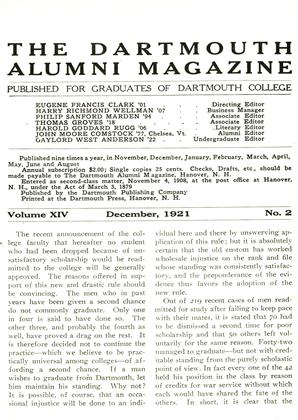An article appearing in an issue of the Concord (N. H.) Patriot last summer gives an interesting account of an investigation in which Professor Frederic P. Lord of the Medical School of Dartmouth has been engaged, as follows:
"Dr. Charles Duncan of this city, and Professor Lord of Dartmouth College have made a study, now almost finished, of the health situation in the rural districts which discloses, among other things, that out of 224 towns in New Hampshire, 120 of them are without any physician. This may mean one of two things: that all the folks are well and need no medicine other than New Hampshire climate, scenery or automobile dust, or that such as are sick resort to an. importation of a physician from some neighboring town.
"Undoubtedly if there were 120 towns in California without a doctor out of a total of 224, it would be but one more testimonial to the benevolent effect of California climate. But the New Hampshire public health experts believe that it is a situation full of menace to allow these rural communities to be doctorless and that some steps should be taken to induce young doctors to settle in small towns and become family doctors in the old-time sense of the word, instead of congregating in cities and becoming specialists.
35 MILES TO AN M. D.
"An instance was recited of a town in the northern part of the state which is 35 miles from the nearest M. D. The custom in that town is for a person who is taken ill to communicate with the other inhabitants to ascertain if any feel in need of medical attention. A "club" is then made up of all inhabitants of the town who want a few pills or an enumeration of the pulse and the doctor's fee for making the visit of 35 miles, which amounts to $35, is split among the several patients. Presumably those who are capable of doing so, save up their sicknesses from day to day until the "club" can be organized on an economical basis.
"Another discovery that Mr. Duncan has announced is that the average age of practicing physicians in New Hampshire is over 50 years. This would indicate that the newer methods of treating the sick may not be receiving the practical demonstration that younger exponents of the profession would be able to give them."
 View Full Issue
View Full Issue
More From This Issue
-
 Article
ArticleALUMNI COUNCIL MEETS
December 1921 By EUGENE F. CLARK -
 Article
ArticleTHE BURYING GROUND
December 1921 By EDWIN JULIUS BARTLETT '72 -
 Article
ArticleTHE FRESHMAN CLASS
December 1921 By E. GOKDON BILL -
 Article
ArticleThe recent announcement of the college faculty that hereafter no student
December 1921 -
 Article
ArticleNEW FACULTY REGULATIONS
December 1921 -
 Sports
SportsFOOTBALL
December 1921
Article
-
 Article
ArticleDepartment Members Who Now Occupy the New Math Center
November 1961 -
 Article
ArticleThree Minutes and One Second
APRIL 1988 -
 Article
ArticleThe X Factor
Mar/Apr 2010 -
 Article
ArticleThe Hanover Scene
March 1953 By BILL McCARTER '19 -
 Article
ArticleIndians Invade Innsbruck
JANUARY 1964 By CLIFF JORDAN '45 -
 Article
ArticlePROFESSOR KELLEY ASSISTS IN KOSCIUSZKO MEMORIAL
March, 1926 By Mr. Rostworowski

